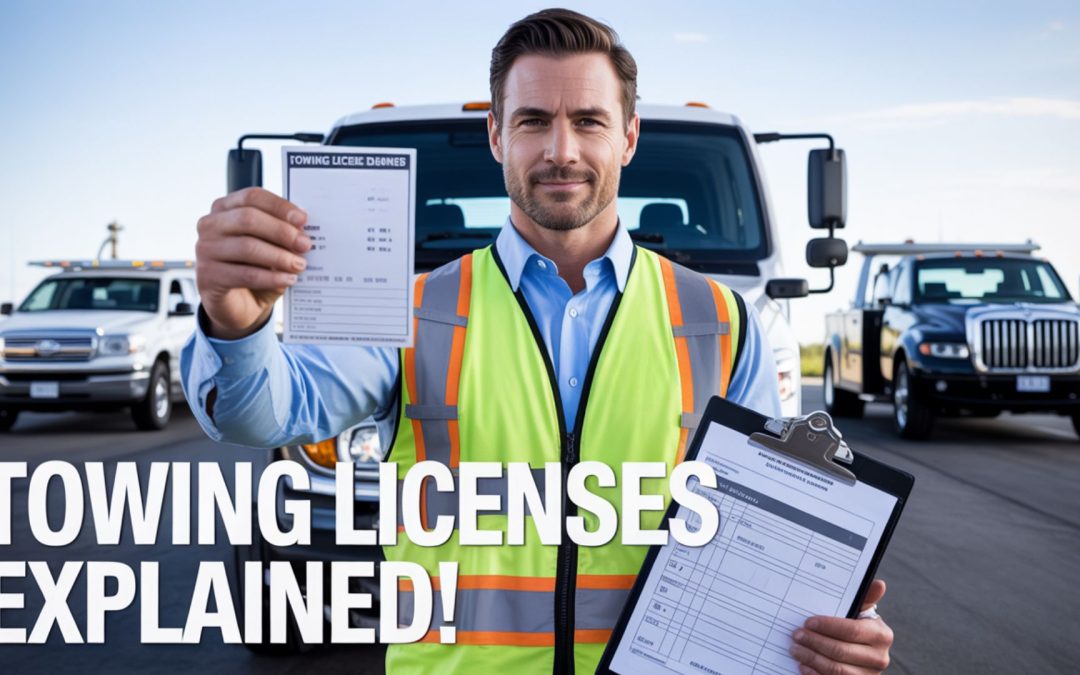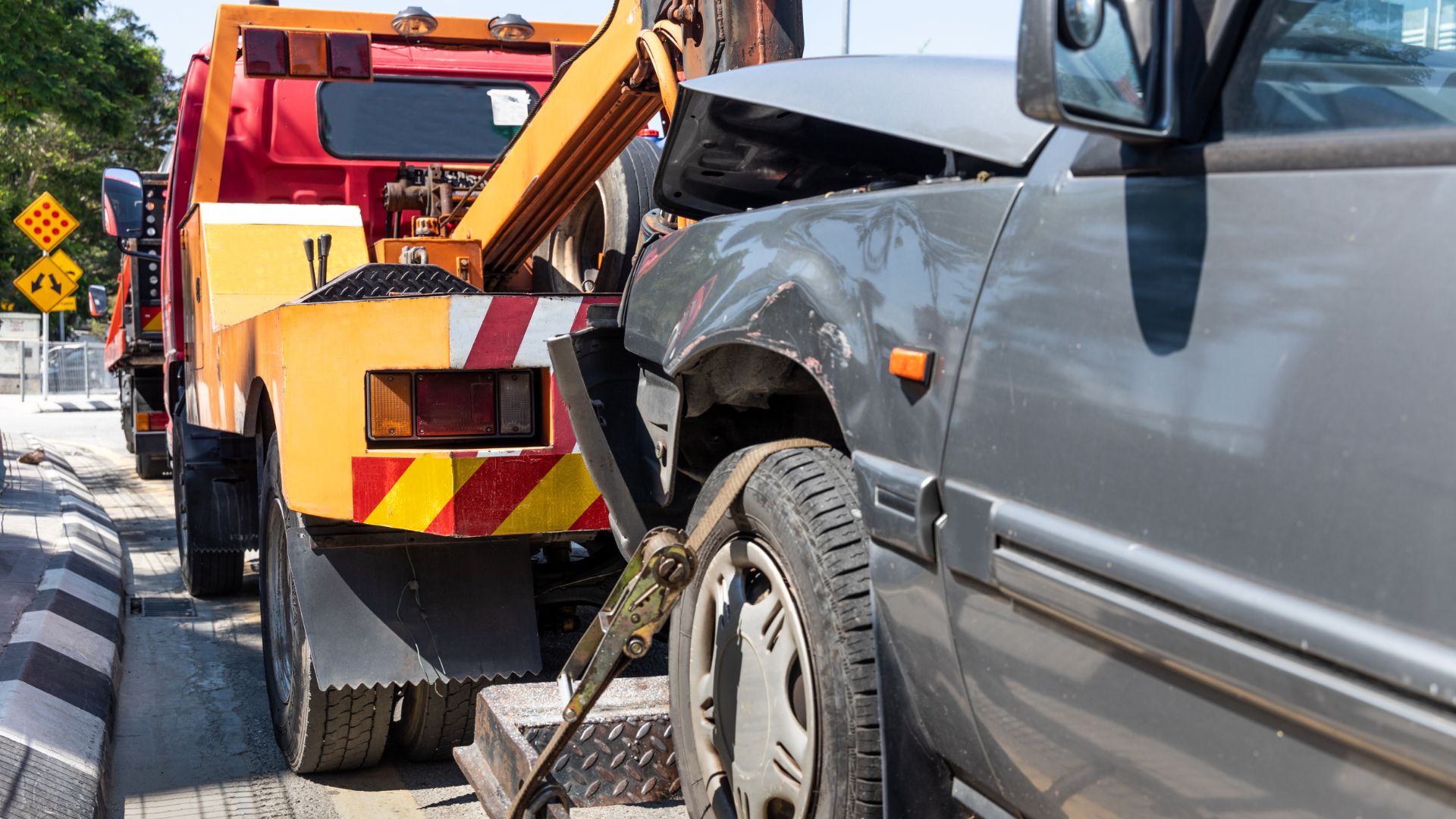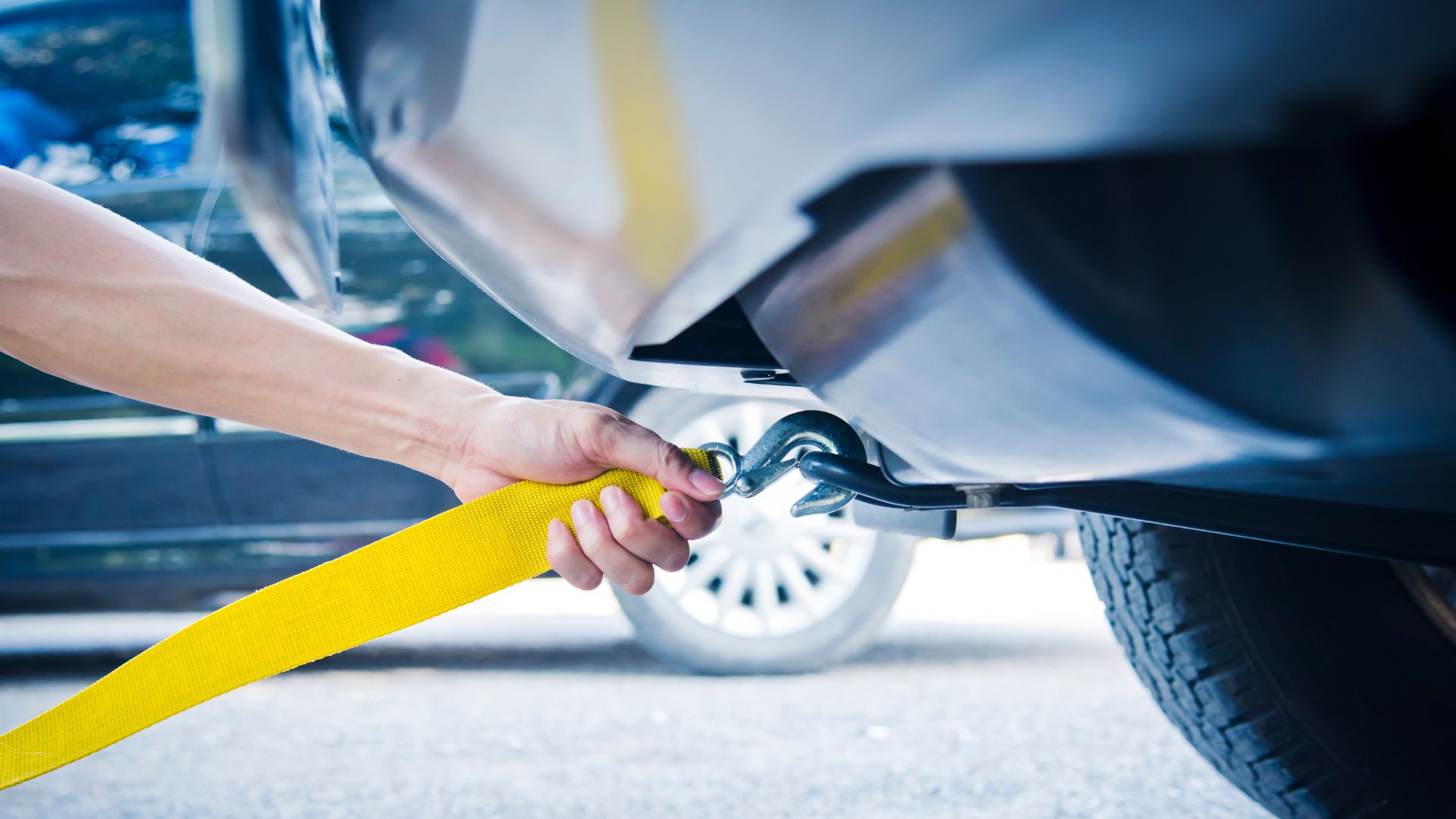Understanding the different types of towing licenses and eligibility is essential for a successful career in the towing industry. This blog will clarify the various licenses, light-duty, medium-duty, and heavy-duty, and the specific qualifications for each, emphasizing the importance of understanding the different types of towing licenses and eligibility. You’ll learn what licenses you need to tow different vehicles and how to meet the regulatory requirements to stay compliant and professional, all while understanding the different types of towing licenses and eligibility.
Key Takeaways
- Towing licenses are categorized into light-duty, medium-duty, and heavy-duty, each requiring specific qualifications and allowing for different towing capabilities.
- Eligibility for towing licenses includes age, experience, physical fitness, and a clean driving record, with structured processes for obtaining and renewing licenses.
- Certification from recognized bodies improves employability and ensures tow truck drivers adhere to safety standards, while continuing education is essential for maintaining high industry standards.
Types of Towing Licenses
In the towing industry, the type of towing license you hold dictates the scope of vehicles you can tow and the services you can provide. The primary categories include light-duty, medium-duty, and heavy-duty towing licenses. Each category requires specific qualifications and allows for the towing of different types of vehicles and equipment.
Understanding these distinctions helps tow truck operators remain properly licensed and compliant with regulatory standards. Here’s a closer look at each type of towing license.
Light-Duty Towing License
A light-duty towing license is necessary for operators towing smaller vehicles, typically those under 10,000 pounds. This license suits new drivers using conventional tow trucks with wheel lift or tires lift systems for light duty training tasks.
Qualifying requires a valid driver’s license and often a national certification program. This ensures operators have the necessary knowledge and skills for safe and efficient light-duty towing.
Medium-Duty Towing License
A medium-duty towing license is required for towing vehicles between 10,001 and 26,000 pounds. It is crucial for operators handling a range of services, including recovering larger motor vehicles.
Obtaining this license involves meeting specific requirements, such as acquiring a commercial driver’s license and completing relevant training. This ensures operators have the expertise for more substantial towing tasks.
Heavy-Duty Towing License
A heavy-duty towing license is required for towing large vehicles and heavy machinery like buses, large trucks, and heavy equipment such as construction equipment. This license demands extensive qualifications, including a commercial driver’s license, significant experience with heavy machinery, and specialized training. Operators must demonstrate the ability to safely operate heavy-duty tow trucks and perform complex recovery operations.
This license is essential for those looking to provide comprehensive towing and recovery services as a tow company recovery operator.
Eligibility Criteria for Towing Licenses
Meeting the eligibility criteria is crucial for aspiring tow truck drivers. These criteria, which vary by license type, generally include:
- Age
- Experience
- Physical fitness
- A clean driving record
These factors ensure operators can perform their duties safely and effectively. Additionally, understanding the tow truck driver requirements is essential for those looking to enter this profession.
Let’s break down these eligibility requirements in more detail.
Age and Experience Requirements
Operating a tow truck typically requires a minimum age of 18, although many employers prefer candidates between 21 and 25 due to experience expectations. New tow truck drivers can gain experience through job shadowing, apprenticeships, or on-the-job training.
While there is no formal educational requirement, having a high school diploma or GED can be beneficial. Vocational schools and community colleges often offer relevant training programs to help new drivers meet these requirements.
Physical Fitness Standards
Physical fitness ensures operators can handle the job’s demands. Tow truck drivers must pass hearing and vision tests to respond effectively in various weather conditions and at accident site with cars. Call operators must also be prepared for the challenges they face.
Maintaining physical fitness helps drivers operate safely and efficiently, reducing the risk of accidents and injuries on the job.
Clean Driving Record
A clean driving record is crucial for qualifying as a tow truck driver. Traffic violations can severely impact one’s ability to obtain or retain a towing license, reflecting on the driver’s reliability and adherence to safety standards. Many states require a commercial driver’s license (CDL) for operating heavier tow trucks.
Background checks are often part of the criminal background check licensing process in most states to ensure that candidates have a history of safe driving.
Licensing Process for Tow Truck Drivers
Obtaining a towing license involves several steps to ensure candidates are prepared for the responsibilities of tow truck driving. This typically includes an application procedure, a written exam, and a practical skills test, each designed to assess the candidate’s knowledge, skills, and readiness for safe towing operations.
Let’s explore each of these steps in detail.
Application Procedure
Applying for a towing license involves completing necessary paperwork, verifying eligibility, and providing vehicle details. A valid driver’s license is required, and applicants may need to complete a national certification program. Additional requirements often include submitting a business certificate, undergoing background checks, and attending a safety seminar.
Completing certified training and education programs also helps prepare candidates for the licensing exams and equips them with the necessary legal and safety knowledge through proper training.
Written Exam
The written exam assesses the candidate’s knowledge of towing operations, safety procedures, and relevant regulations. Passing typically requires a score between 70% and 80%, depending on state regulations.
This exam ensures that tow truck drivers are well-versed in the theoretical aspects of their job, preparing them for real-world scenarios.
Practical Skills Test
The practical skills test evaluates a candidate’s ability to safely operate a tow truck and perform essential towing maneuvers. Candidates must demonstrate proficiency in using towing equipment and executing recovery methods during this test.
Preparing for the practical skills test involves practicing various towing techniques and ensuring familiarity with operating tow trucks efficiently. This hands-on assessment is critical for confirming a candidate’s readiness to handle towing operations safely.
Certification from the Towing and Recovery Association
Certification from recognized bodies like the Towing and Recovery Association of America (TRAA) benefits tow truck drivers and operators in several ways:
- The TRAA sets national standards for certification, enhancing industry standards.
- Certification significantly improves employability.
- Their programs ensure towing professionals have the necessary skills and knowledge to perform their duties effectively.
Let’s explore the different levels of certification and the importance of continuing education.
Levels of Certification
The TRAA offers multiple certification tiers, each requiring different levels of expertise and experience. Level 1 requires 90 days of towing experience and passing a 100-question exam. Level 2 necessitates at least one year of experience as a medium or heavy-duty tow truck operator.
The final level, Master Tower certification, demands two years of professional experience and prior Level 2 certification. Achieving these certifications demonstrates a tow truck operator’s commitment to excellence and professionalism in the industry.
Continuing Education
Continuing education keeps towing professionals updated on safety procedures and industry best practices. Many states require tow truck operators to complete continuing education courses annually or biennially to maintain certifications. These courses cover:
- Safety procedures
- Legal compliance
- Customer service
- Industry best practices.
Continuing education ensures that tow truck drivers remain informed about the latest developments in their field and continue to meet regulatory obligations.
Legal and Insurance Considerations
Operating a tow truck business involves several legal and insurance considerations to ensure compliance and protect the business. Legal compliance includes obtaining necessary licenses and permits, while insurance requirements cover liability, property damage, and workers’ compensation. Adhering to these requirements ensures smooth business operations and allows the business to legally operate and safeguards against potential risks.
Let’s delve into the specifics of legal compliance and insurance requirements.
Legal Compliance
Legal compliance is crucial for operating a successful tow truck business. Drivers must have the following licenses and permits:
- A commercial driver’s license
- An operator license
- A tow truck permit
- A business license
Non-compliance can lead to severe consequences, including fines, penalties, and revocation of operating certificates.
Adherence to regional laws and maintaining a drug test-free status are also critical for avoiding legal complications and ensuring the safety and professionalism of towing operations.
Insurance Requirements
Insurance coverage is essential for running a tow truck business. Operators need coverage for:
- Liability
- Property damage
- Workers’ compensation
- On-hook coverage, which protects vehicles being transported
- Business interruption insurance, which reimburses for revenue loss due to covered damages.
Obtaining a towing license is typically required to secure insurance, and maintaining up-to-date certifications can lead to reduced insurance premiums. Proper insurance coverage safeguards the business and ensures its sustainability.
Benefits of Proper Licensing and Certification
Proper licensing and certification offer numerous benefits, including increased job opportunities, enhanced safety and professionalism, and improved customer trust and business reputation.
Completing the necessary certifications and maintaining licensing standards ensure that towing professionals are well-prepared to handle their duties and meet industry expectations. Let’s explore these benefits in more detail.
Increased Job Opportunities
Proper licensing and certification open significant job opportunities. Completing all certification levels makes an individual a versatile and well-rounded candidate for any towing job.
Collaborating with the following community enterprises and organizations can increase clientele and ensure consistent work for a towing business:
- Auto repair shops
- Fuel stations
- Law enforcement
- Roadside assistance organizations
These opportunities are essential for career growth and business expansion.
Enhanced Safety and Professionalism
Licensing and certification enhance safety and professionalism in towing operations through:
- Licensed drivers being better prepared for emergencies, ensuring safer practices.
- Continuing education helping to meet regulatory obligations.
- Continuing education improving service delivery.
Both licensing and continuing education are essential for maintaining high safety standards and professionalism in the towing industry.
Customer Trust and Business Reputation
Certification and proper licensing significantly enhance customer trust and business reputation. Certified towing services are more likely to receive positive reviews, boosting their reputation. Customers prefer certified services, knowing they adhere to higher safety and service standards.
This positive perception encourages repeat business and customer loyalty, essential for long-term success in the towing industry.
Maintaining Your Towing License
Maintaining a towing license involves adhering to laws and regulations, fulfilling renewal requirements, and completing ongoing education. This ensures operators remain compliant with industry standards and continue providing high-quality services. Staying on top of your licensing is crucial in the towing industry. Knowing how to check the status of your TDLR towing license in Texas ensures you’re always compliant and ready to hit the road without interruptions.
Let’s explore the renewal process and continuing education requirements essential for maintaining your towing license.
Renewal Process
The renewal process generally requires proof of a valid state issued driver’s license and may include drug testing documentation. If a towing license has expired for more than 90 days, the renewal fee increases significantly compared to the standard fee.
Missing the renewal deadline can result in penalties or suspension of operations, making timely renewal crucial for uninterrupted business activities.
Continuing Education Requirements
Tow truck operators must complete at least four hours of continuing education during each licensing cycle. These courses cover safety and regulatory topics, ensuring operators stay informed about industry developments. Continuing education maintains high standards of safety and professionalism, helping operators stay compliant with regulatory updates and best practices.
Final Thoughts on Towing Licenses and Eligibility
Understanding the different types of towing licenses and eligibility is essential for anyone pursuing a career in the towing industry. Whether it’s light-duty, medium-duty, or heavy-duty towing, each license serves a specific purpose and ensures that operators have the knowledge and skills required for safe and effective towing. By meeting the outlined eligibility requirements, such as maintaining a clean driving record, staying physically fit, and gaining relevant experience, professionals can not only excel in their roles but also contribute to a safer and more reliable industry.
For those looking to obtain or renew a towing license in Texas, State Approved Continuing Education provides TDLR-approved courses designed to fit your needs. Our courses are structured to help you stay compliant with the latest industry standards while advancing your skills and career. Take the next step with us and ensure your professional success in the towing industry!
Frequently Asked Questions
What are the different types of towing licenses?
Different types of towing licenses include light-duty, medium-duty, and heavy-duty, each designed for specific vehicle weights and towing requirements. It’s important to choose the appropriate license based on the type of towing you’ll be performing.
What are the age and experience requirements for becoming a tow truck driver?
To become a tow truck driver, you typically need to be at least 18 years old, although many employers prefer candidates between 21 and 25. Gaining experience through apprenticeships, job shadowing, and on-the-job training is also beneficial.
Why is physical fitness important for tow truck drivers?
Physical fitness is crucial for tow truck drivers as it enables them to manage the physical demands of their work and maintain safety and efficiency while responding to different situations. Being fit helps in reducing fatigue and preventing injuries, ensuring they can perform their duties effectively.
What does the licensing process for tow truck drivers involve?
The licensing process for tow truck drivers involves submitting an application, passing a written exam, and completing a practical skills test to ensure competency in towing operations. Successfully navigating these steps is essential for obtaining the necessary license.
How can proper licensing and certification benefit a tow truck driver?
Proper licensing and certification significantly enhance a tow truck driver’s job opportunities, safety, and professionalism, ultimately fostering customer trust and bolstering their business reputation. This establishes a competitive edge in the industry.



